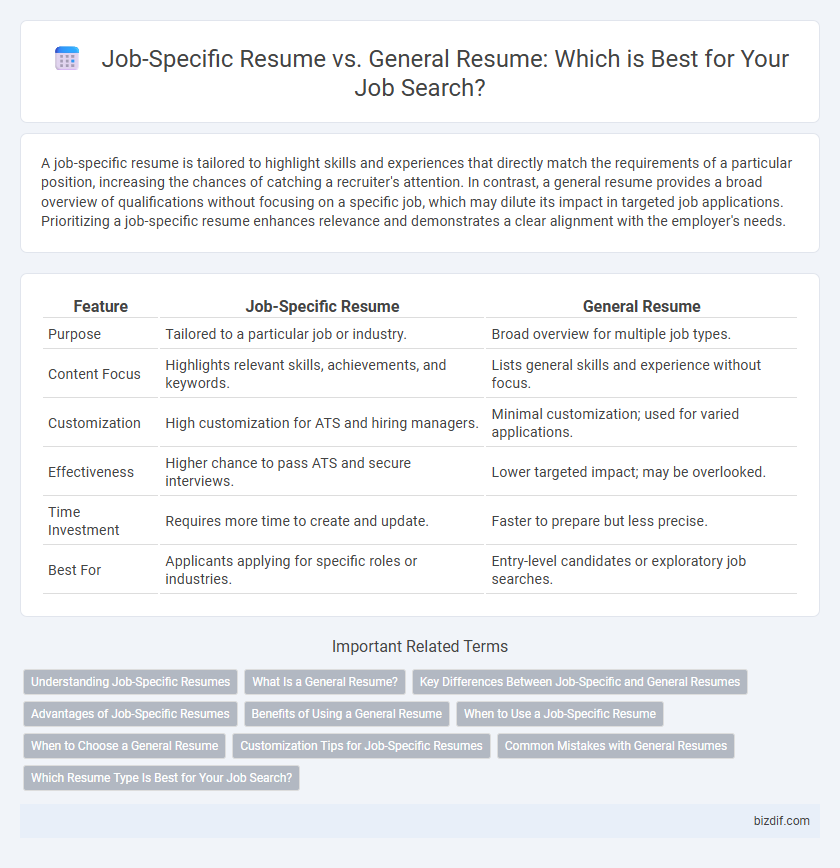A job-specific resume is tailored to highlight skills and experiences that directly match the requirements of a particular position, increasing the chances of catching a recruiter's attention. In contrast, a general resume provides a broad overview of qualifications without focusing on a specific job, which may dilute its impact in targeted job applications. Prioritizing a job-specific resume enhances relevance and demonstrates a clear alignment with the employer's needs.
Table of Comparison
| Feature | Job-Specific Resume | General Resume |
|---|---|---|
| Purpose | Tailored to a particular job or industry. | Broad overview for multiple job types. |
| Content Focus | Highlights relevant skills, achievements, and keywords. | Lists general skills and experience without focus. |
| Customization | High customization for ATS and hiring managers. | Minimal customization; used for varied applications. |
| Effectiveness | Higher chance to pass ATS and secure interviews. | Lower targeted impact; may be overlooked. |
| Time Investment | Requires more time to create and update. | Faster to prepare but less precise. |
| Best For | Applicants applying for specific roles or industries. | Entry-level candidates or exploratory job searches. |
Understanding Job-Specific Resumes
Job-specific resumes are tailored to highlight skills, experiences, and achievements directly related to a particular job opening, increasing relevance to hiring managers and applicant tracking systems (ATS). They integrate industry keywords and job-specific terminology, enhancing visibility in automated resume screenings and demonstrating precise alignment with the role's requirements. This targeted approach boosts chances of interview invitations by showcasing a candidate's ability to meet the employer's unique needs.
What Is a General Resume?
A general resume provides a broad overview of your skills, experience, and education without tailoring content to a specific job or industry. It serves as a foundation document that can be easily customized for different positions but lacks targeted keywords and achievements relevant to a particular role. Employers often prefer job-specific resumes because they highlight qualifications directly aligned with the job description, increasing the chances of passing applicant tracking systems (ATS) and securing interviews.
Key Differences Between Job-Specific and General Resumes
Job-specific resumes tailor skills and experiences to align directly with the job description, enhancing relevance to applicant tracking systems and hiring managers. General resumes present a broad overview of qualifications without customization, making them less effective for targeted job applications. Emphasizing keywords, achievements, and competencies related to the specific role significantly improves the chances of passing initial resume screenings.
Advantages of Job-Specific Resumes
Job-specific resumes increase the chances of passing applicant tracking systems (ATS) by incorporating relevant keywords tailored to a particular role. They highlight pertinent skills and experiences, making candidates stand out to hiring managers seeking specialized expertise. This targeted approach often results in higher interview rates compared to general resumes.
Benefits of Using a General Resume
A general resume highlights a broad skill set and versatile experience, making it suitable for multiple job applications across various industries. This approach reduces preparation time by streamlining the creation process, allowing faster responses to diverse job postings. Employers appreciate the adaptability demonstrated by candidates who submit a well-crafted general resume.
When to Use a Job-Specific Resume
A job-specific resume is most effective when applying for a targeted position that requires tailored skills and experiences directly aligning with the job description. It highlights relevant achievements and keywords, increasing the chances of passing Applicant Tracking Systems (ATS) and catching the recruiter's attention. Use a job-specific resume when the role demands specialized qualifications or when competing in a highly competitive job market.
When to Choose a General Resume
A general resume is ideal for job seekers applying to multiple positions across various industries or roles without specialized requirements. It highlights transferable skills and broad experiences that appeal to a wide range of employers, increasing flexibility in job applications. Choosing a general resume is strategic when the applicant's career goals are diverse or when entering entry-level or transitional job markets.
Customization Tips for Job-Specific Resumes
Tailor your job-specific resume by integrating keywords from the job description, ensuring alignment with the employer's requirements and applicant tracking systems (ATS). Highlight relevant skills, experiences, and achievements directly related to the role, using quantifiable metrics to demonstrate impact. Use a clear, targeted summary and customized bullet points to emphasize your suitability for the specific position, enhancing your chances of standing out to hiring managers.
Common Mistakes with General Resumes
Using a general resume often results in vague job descriptions and a lack of relevant keywords, reducing its effectiveness in applicant tracking systems (ATS). Common mistakes include failing to tailor skills and experiences to the specific job requirements, which diminishes the resume's impact. Highlighting quantifiable achievements and customizing content to match job descriptions significantly improves the chances of passing ATS filters and attracting recruiter attention.
Which Resume Type Is Best for Your Job Search?
Job-specific resumes increase your chances of passing applicant tracking systems by targeting keywords and skills relevant to a particular position, enhancing hiring managers' ability to quickly identify your qualifications. General resumes offer broader appeal for multiple roles but may lack the precision needed to stand out in highly competitive job markets. Choosing the optimal resume type depends on whether you're applying to a specialized role requiring tailored qualifications or exploring diverse opportunities in various industries.
Job-Specific Resume vs General Resume Infographic

 bizdif.com
bizdif.com